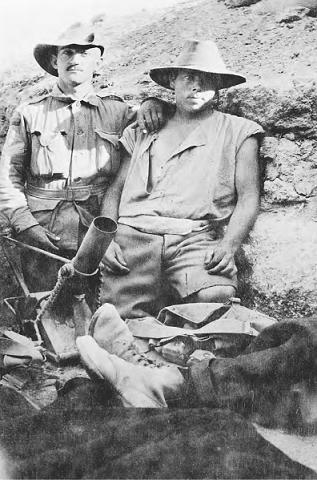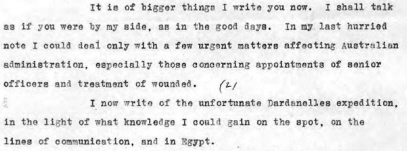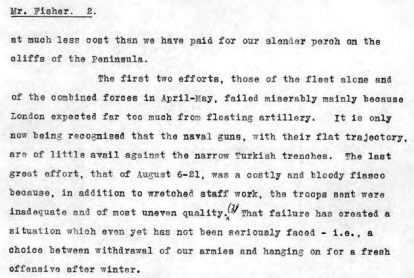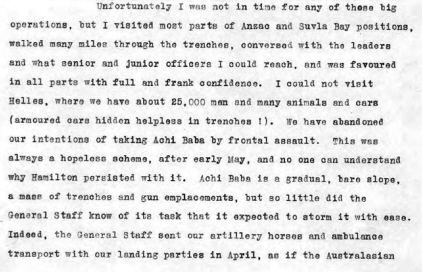The Gallipoli Letter (9 page)

I told you in my last letter of the necessity for canteen ships, and need not go into that now, but on the point of the general staff I must say that the work at the bases in Egypt struck me as on a par with that of the Aragon. Some day you will have to take up the case of Sir John Maxwell. He has a poor brain for his big position, and I assure you that our officers at Anzac have a poor opinion of the work of his lieutenant, General Spens [âa man broken on the continent, and therefore thought good enough to supervise the training of Australiansâ] [
omitted
] who is controlling our bases. The question you will have to fight out about Maxwell is this. After the last disturbance in the Whasa, when a very few of our men burnt some houses in which they had been drugged and diseased, he issued one of his famous lecturing orders, in which he referred to his regret that “even wilful murder” had been mentioned as one of the Australian crimes in Cairo. In this casual way did he blast the good name of our clean and vigorous army. I inquired as far as was possible, and could hear nothing of even a charge of wilful murder mentioned against any Australian. This order roused intense anger amongst our men. Perhaps we are too sensitiveâ. Our men were certainly too sensitive in their anger in the trenches when a notice was posted, I think in orders, describing how an unfortunate British Tommy had been shot at Helles at dawn for cowardice. It was almost amusing to hear our men resent this even remote connection with the Australian forces and a veiled threat of such shooting. “Such things have nothing to do with us,” they said.
Our men feel that their reputation is too sacred to leave in the hands of Maxwell, and they much resent the sudden change in the attitude of the general staff, which regarded them as criminals in Cairo, and now lavishly calls them heroes in Gallipoli.
You will think that all this is a sorry picture, but do not forget that the enemy has his troubles, and that we have certain signs that his morale is deteriorating. From what I saw of the Turk I am convinced that he is a brave and generous foe, and he is fighting now for dear home, with a feeling that he is winning, and that he is a better man than those opposed to him. The Turks by the way are as generous in their praise of our men as the British and French are. Certainly the Turks are positively afraid of our men, and one of their trenchesâthat opposite Quinn's Postâis such a place of fear, owing to the indomitable way in which our snipers and bomb-throwers have got their men down, that Turks will not go into it unless they are made corporals. So say our Intelligence Officers. I saw many strange and remarkable instances of the humanity and courage of the Turks. Certainly his trenches are better than anything we can do, and he makes them remarkably quickly.
One word more to-day. Do for Heaven's sake make every effort to secure the recall of Sir James Porter, the Englishman in charge of the medical services. Our doctors are without exception furious with him. He made a shocking muddle of the first arrangements for transport of wounded, as I wrote you. The case against him there was unanswerable. But he has been left in charge, and his muddling continues. He lives on a luxurious yacht in Mudros. Oh, no Australian has the heart to tell of the fearful wreckage of life due to this man's incompetency. That is not a wild statement. It is truth. Even now, the great bulk of the wounded are sent to Imbros before being passed on to hospitals elsewhere. This handling aggravates sickness and wounds, yet the Generals wonder why men are sent away from the peninsula with slight sickness become worse and do not, as expected, return in a few weeksâdo not return at all. Our Australian doctors have bearded Porter in his den, and talked open defiance to him, in the vain hope that he would insist on an inquiry, or lay a charge against them. We must make the best of the R.A.M.C., but we surely need not be burdened with Porter's sins. After having heart and seen something of the awful bungling of the wounded transport arrangements, one wonders how it is possible that the War Office should regard with complacency the prospect of leaving this man the very difficult work of getting sick and wounded from the peninsula during the winter. The only reason I can think of is that professional soldiers stick to each other through thick and thin.
I hope I have not made the picture too gloomy. I have great faith still in the Englishman. And, as I have said, the enemy is having his own troubles too. But this unfortunate expedition has never been given a chance. It required large bodies of seasoned troops. It required a great leader. It required self-sacrifice on the part of the staff as well as that sacrifice so wonderfully and liberally made on the part of the soldiers. It has had none of these things. Its troops have been second class, because untried before their awful battles and privations of the peninsula. And behind it all is a gross selfishness and complacency on the part of the staff.
Much more I could tell you, but my task is done, though I shall write again next mailâI hope with better news. This of course is a private letter, but you will show it to George Pearce and Hughes, so I shall say nothing more than the plain goodbye of a friend.
Sincerely yours,
[Keith Murdoch]
Letter regarding Murdoch's appointment to investigate postal facilities
in Cairo:
Department of Defence,
Melbourne, 9th July, 1915.
Dear Sir,
In view of numerous complaints which have reached the Commonwealth Government regarding the non-delivery of letters and cables to members of the Australian Imperial Force in Egypt, and the difficulty experienced by persons in Australia in obtaining information concerning wounded and sick relatives, it is thought that the public uneasiness in these matters would be allayed if a report by some persons unconnected with the Forces could be obtained as to the arrangements that have been made in Egypt for these services. The Government has accordingly authorised Mr Keith Murdoch, an Australian journalist, who is on his way to England, to make enquiries when passing through Egypt with a view to furnishing me with a report upon the matters alluded to.
Any assistance which you can see your way to render Mr Murdoch in connection with his enquiries will be very much appreciated by my colleagues and myself.
Yours sincerely,
(Sgd) G.F. PEARCE
Minister for Defence.
G.O.C. in Chief,
EGYPT.
Murdoch's letter of introduction to Sir Ian Hamilton:
[
handwritten at top of page
]
My dear Birdwood,
This gentleman is duly authorisedâhelp him in any way you can.
Yours ever,
Ian Hamilton
2.9.15
Department of Defence.
Melbourne. 13th July 1915.
Dear Sir Ian Hamilton,
Mr Keith Murdoch, Pressman of Sydney and Melbourne, is on his way to London to fill an appointment there and has been asked by this Government to make certain enquiries in connexion with postal facilities at the Base in Egypt, and as to the disposition of wounded. It might just happen that circumstances will favour him to the extent of meeting yourself and, in case this should be so, I have much pleasure in giving him this letter of introduction.
Yours sincerely,
G.F. Pearce
General Sir Ian Hamilton. G.C.B. D.S.O.
General Officer Commanding in Chief.
Mediterranean Expeditionary Force.

A letter from Keith Murdoch to Prime Minister H.H. Asquith:
Arundel Hotel,
Victoria Embankment.
September 25, 1915.
The Right Honourable H. H. Asquith, P.C., M.P.,
Prime Minister.
Dear Sir,
Mr. Lloyd George has suggested to me that I should place at your disposal whatever knowledge I gained of the Dardanelles operations while an Australian civilian representative there.
I therefore take the liberty of sending to you a copy of a private letter I have addressed to Mr. Fisher, in conformance with his request that I should write him fully on the subject.
This letter was, of course, intended only for Commonwealth Ministers, and contains references which will have no interest to you. But I feel justified in sending it to you, because if it adds one iota to your information, or presents the Australian point of view, it will be of service in this most critical moment.
I write with diffidence, and only at Mr. Lloyd George's request. In any case, you will know that my motive is one of affectionate regard for our soldiers' interests.
I have the honour to be,
Your obedient servant,
KM
FACSIMILE OF THE
GALLIPOLI LETTER




